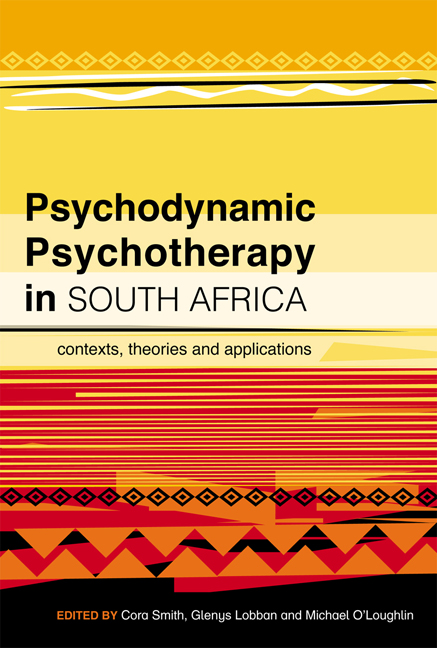Book contents
- Frontmatter
- Contents
- Editors
- Contributors
- Acknowledgements
- Acronyms
- Introduction Cora Smith
- Section I Subjectivity and identity
- Section II Traumatic stress
- Section III Social issues
- Chapter 6 Unconscious meaning and magic: Comparing psychoanalysis and African indigenous healing
- Chapter 7 Intimate partner violence in post-apartheid South Africa: Psychoanalytic insights and dilemmas
- Chapter 8 Serial murder and psychoanalysis in South Africa: Teasing out contextual issues amid intrapsychic phenomena in two case studies
- Chapter 9 Some psychoanalytic reflections on a project working with HIV orphans and their caregivers
- Chapter 10 Reclaiming genealogy, memory and history: The psychodynamic potential for reparative therapy in contemporary South Africa
- Afterword Glenys Lobban and Michael O'Loughlin
- Index
Chapter 7 - Intimate partner violence in post-apartheid South Africa: Psychoanalytic insights and dilemmas
from Section III - Social issues
Published online by Cambridge University Press: 21 April 2018
- Frontmatter
- Contents
- Editors
- Contributors
- Acknowledgements
- Acronyms
- Introduction Cora Smith
- Section I Subjectivity and identity
- Section II Traumatic stress
- Section III Social issues
- Chapter 6 Unconscious meaning and magic: Comparing psychoanalysis and African indigenous healing
- Chapter 7 Intimate partner violence in post-apartheid South Africa: Psychoanalytic insights and dilemmas
- Chapter 8 Serial murder and psychoanalysis in South Africa: Teasing out contextual issues amid intrapsychic phenomena in two case studies
- Chapter 9 Some psychoanalytic reflections on a project working with HIV orphans and their caregivers
- Chapter 10 Reclaiming genealogy, memory and history: The psychodynamic potential for reparative therapy in contemporary South Africa
- Afterword Glenys Lobban and Michael O'Loughlin
- Index
Summary
INTRODUCTION
South African statistics reveal alarmingly high levels of violence in intimate partner relations. Figures from the Gender Links Gender Based Violence Indicators Project, conducted in Gauteng province between April and July 2010, found that 51% of women have experienced some kind of violence in their intimate relationships. The same project found that 75% of partnered men admitted to perpetrating violence (Gender Links, 2011: 2). A report examining masculinities and public policies in South Africa quotes figures showing that in 2000, violence and homicide were the second most common causes of unnatural death of men and women (Redpath et al., 2008). The same report notes that half the women killed were killed by intimate partners (Redpath et al., 2008). Intimate partner violence or domestic violence is neither a new nor a uniquely South African phenomenon. However, the transition to political democracy in South Africa laid bare the connection between the public and the private and, in so doing, provoked new questions about how we understand intimate partner violence and its prevention.
This chapter explores a theoretical framework for understanding the psychosocial conditions that create the possibilities for intimate partner violence and how such theoretical insights might inform interventions in the public sphere that are aimed at preventing domestic violence. The chapter argues that by calling attention to the interface between socio-political conditions and the psychic dynamics of gender, psychoanalytic feminist and intersubjective theories provide a more complex understanding of domestic violence in post-apartheid South Africa. An intersubjective account of gender violence has significant implications for programmes of intervention that have proliferated post-apartheid to address issues of gender rights and gender violence. In particular, this chapter argues that where the focus is on ‘education’ and training, psychodynamic conceptions of the subject unsettle the conviction that by addressing rational cognitive processes, attitudes and behaviours will change. Psychodynamic theory challenges us to consider that questioning established gender hierarchies evokes anxiety and that defences against anxiety complicate the reception of public messaging
Research on men's responses to the focus on gender rights in the aftermath of the transition to democracy raises questions for which an exclusive focus on social and political factors is not sufficient – in particular, how and why men who are frustrated by the failure of the promises of political transformation convert the women with whom they are intimately involved into threats.
- Type
- Chapter
- Information
- Psychodynamic Psychotherapy in South Africacontexts, theories and applications, pp. 169 - 193Publisher: Wits University PressPrint publication year: 2013



